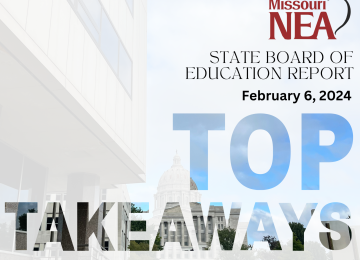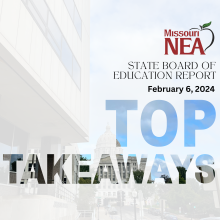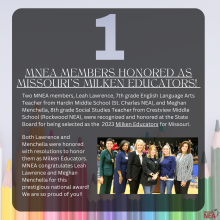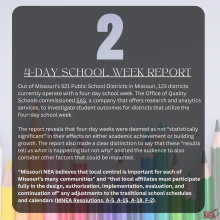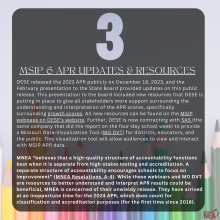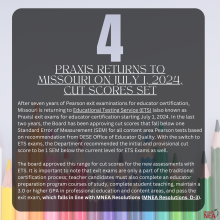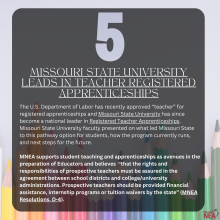1. Honoring of MNEA Members Leah Lawrence and Meghan Menchella, Missouri 2023 Milken Educators
Two MNEA members, Leah Lawrence, 7th grade English Language Arts Teacher from Hardin Middle School (St. Charles NEA), and Meghan Menchella, 8th grade Social Studies Teacher from Crestview Middle School (Rockwood NEA), were recognized and honored at the State Board for being selected as the 2023 Milken Educators for Missouri. Both Lawrence and Menchella were honored with resolutions to honor them as Milken Educators. The awards were announced at all school assemblies for each winner on November 19 and came with an unrestricted $25,000 cash prize and “powerful professional development opportunities” with the Milken Educator Network.
MNEA congratulates Leah Lawrence and Meghan Menchella for this prestigious national award!

Out of Missouri’s 521 Public School Districts in Missouri, 123 districts currently operate with a four-day school week. In 2011, the first District adopted a four-day school week (171.031, RSMo) and the number of districts steadily grew until 2020 when there was a significant increase in districts moving towards this model. The Office of Quality Schools commissioned SAS, a company that offers research and analytics services, to investigate student outcomes for districts that utilize the four-day school week.
The report reveals that, of the 123 school districts, students who experience the four-day school week are “more likely to be rural, white, and receive free or reduced-price lunch, are less likely to be gifted, English learner/limited English proficiency, and had lower achievement and growth prior to adopting the four-day week.” Further, the SAS team compared school districts that adopted the four-day week before the pandemic to districts that adopted the four-day week after the pandemic and both findings revealed very small effect sizes that were deemed as not “statistically significant” in their effects on either academic achievement or building growth.
The report also made a clear distinction to say that these “results tell us what is happening but not why” and led the audience to also consider the “importance of the fifth day, changes in total instructional time, differences in impact based on urbanicity, and potential impact on other outcomes [beyond just achievement and growth].”
“Missouri NEA believes that local control is important for each of Missouri’s many communities” and “that local affiliates must participate fully in the design, authorization, implementation, evaluation, and continuation of” any adjustments to the traditional school schedules and calendars (MNEA Resolutions, A-5, A-15, A-18, F-2).
3. Update on Missouri School Improvement Program (MSIP) 6 Annual Performance Report (APR)
DESE released the 2023 APR publicly on December 18, 2023, and the February presentation to the State Board provided updates on this public release. This presentation did not include much information on the scores themselves but was mostly focused on an overview of the APR release, resources available, and next steps for MSIP 6 Communication. Based on the content presented to the Board, it is inferred that there have been high levels of inquiry from various stakeholders about the Missouri Growth Model, which is used to calculate the growth portion of the APR. During this presentation, there was a brief explanation of the history of the Missouri Growth Model, how it came to be included in the APR Calculation, and DESE’s criteria for APR data before release (accurate, timely, and meaningful with actionable information). DESE recognizes that in order for the data to be accurate and meaningful, the timeliness of the score releases are sacrificed and DESE states they are working on getting data out earlier for districts.
This presentation to the board included new resources that DESE is putting in place to give all stakeholders more support surrounding the understanding and interpretation of the APR scores. There is a series of four, one-hour webinars from February-June 2024 that anyone can join–all information can be found on the MSIP webpage on DESE’s website.
Further, DESE is now contracting with SAS (the same company that did the report on the four-day school week) to provide a Missouri Data-Visualization Tool (MO DVT) for districts, educators, and the public. This visualization tool will allow audiences to view and interact with MSIP APR data. The goal with this program is to make the data more meaningful and actionable for all stakeholders. There is a webinar giving an overview of this program on Thursday, 2/15 from 9-11 AM.
While these webinars and MO DVT are resources to better understand and interpret APR results could be beneficial, MNEA is concerned of their unwieldy release. They have arrived at an inopportune time for the 2024 APR, which does count for classification and accreditation purposes (for the first time since 2018). These informative webinars and resources are only just now an option for stakeholders–two years into MSIP 6–and will be available during and after the 2024 MAP and EOC testing windows, which will be the scores that are used in the 2024 APR calculation. MNEA “believes that a high-quality structure of accountability functions best when it is separate from high-stakes testing and accreditation. A separate structure of accountability encourages schools to focus on improvement” (MNEA Resolutions, A-4).
4. Passing Score on New Teacher Candidate Assessments (ETS)
After seven years of Pearson exit examinations for educator certification, Missouri is returning to Educational Testing Service (ETS) (also known as Praxis) exit exams for educator certification starting July 1, 2024. In the last two years, the Board has been approving cut scores that fall below one Standard Error of Measurement (SEM) for all content area Pearson tests based on recommendation from DESE Office of Educator Quality.
With the switch to ETS exams, the Department recommended the initial and provisional cut score to be 1 SEM below the current level. The board approved this range for cut scores for the new assessments with ETS. The Office of Educator Quality will collect data on results from the ETS assessments to determine if any future movement needs to be made for cut scores. It is important to note that exit exams are only a part of the certification process; teacher candidates must also complete an educator preparation program courses of study, complete student teaching, maintain a 3.0 or higher GPA in professional education and content areas, and pass the exit exam, which falls in line with MNEA Resolutions (MNEA Resolutions, D-3).
5. Registered Teacher Apprenticeships in Missouri
The U.S. Department of Labor has recently approved “teacher” for registered apprenticeships, and Missouri State University has since become a national leader in Registered Teacher Apprenticeships. During this presentation, the Office of Educator Quality gave context to DESE’s role in supporting Educator Preparation Programs who offer apprenticeships as a pathway for candidates. Missouri State University faculty–Dr. Barri Tinkler and Dr. Reesha Adamson–presented on what led Missouri State to this pathway option for students, how the program currently runs, and next steps for the future.
MNEA supports student teaching and apprenticeships as avenues in the preparation of Educators and believes
“that the rights and responsibilities of prospective teachers must be assured in the agreement between school districts and college/university administrations. Prospective teachers should be provided financial assistance, internship programs or tuition waivers by the state” (MNEA Resolutions, D-4).
MNEA believes that every student and educator deserves the best experience possible in schools. That is why we are the only educational organization that is consistently present at every meeting of DESE, the state board of education, and the Missouri Legislature. We are your eyes and ears where decisions are being made about your schools when you cannot be.
The next meeting of the Missouri State Board of Education will be held on March 5, 2024, at DESE in Jefferson City, Missouri. If you have any questions or suggestions, please contact Samantha Hayes at 800-392-0236 or Samantha.Hayes@mnea.org.
The monthly State Board Report is also available in Podcast form at MNEA Connects. Listen on Amazon Music, Apple Podcast, Podbean, or Spotify.


